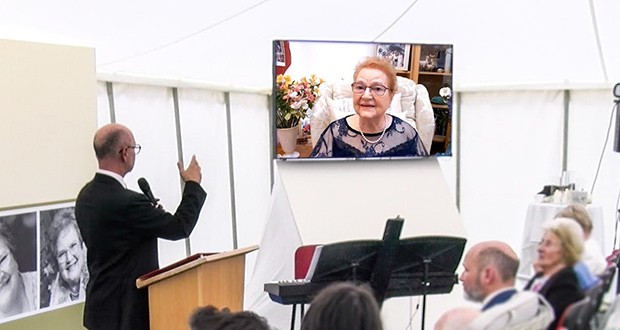Startup StoryFile, which originally sought to preserve Holocaust memories, records the subject answering questions with 20 synchronised cameras before creating the illusion of conversation.
A Los Angeles-based start-up company has developed a ‘holographic conversational video experience’ that allows mourners at funerals to have conversations with the dead.
StoryFile creates a digital clone of the subject by using 20 synchronised cameras to record them answering a series of questions. The footage is then processed, with clips tagged and used to train an artificial intelligence (AI) that can provide responses to questions in natural language.
One of the first users of the technology was Marina Smith MBE – the mother of StoryFile’s chief executive Dr Stephen Smith – who died in June at the age of 87. In January, Smith, the co-founder of the UK’s National Holocaust Centre and Museum, chose topics she thought her friends and family would want to ask about at her funeral. She then spent several hours over a two-day period recording two-minute video answers to 75 from a database of 250,000 potential questions, using a webcam and her computer.
At her funeral, Smith addressed her friends and family through a pre-recorded video about her life and spirituality. She was also able to answer questions from her loved ones during the memorial service, with the hologram creating the illusion of a real-time conversation.
When it was launched in 2017, StoryFile was conceived as a way to preserve the stories of Holocaust survivors and to talk to historical figures. It is part of a growing trend of tech companies creating tools that allow people to talk to the dead, from digital memorials to chatbots impersonating the deceased. In June, Amazon showed how its Alexa virtual assistant could read a bedtime story in the voice of a deceased relative. Microsoft has also shown an interest in virtually reviving the dead, patenting a chatbot that pulls data from a person’s social media posts.
Tech bringing the dead back to life has also shown up in Hollywood. In 2019, Disney included late actress Carrie Fisher in the Star Wars: The Rise of Skywalker film by combining real footage of her face with a completely digital character. StoryFile itself worked with Star Trek’s William Shatner last year to create a hologram that will help “preserve his memory and legacy for generations to come”.
Reference : AVinteractive


